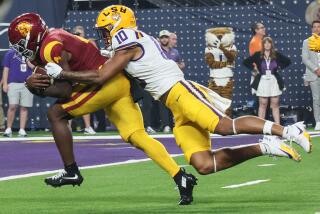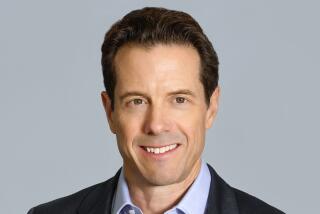ESPN is looking for a win with its new streaming service. Here’s what it will include
ESPN President James Pitaro talks a lot about having a direct relationship with the consumer, even in his own household.
As head of the Walt Disney Co.’s consumer products and interactive media division, he often used his two children as a test market for new toys and gadgets.
Last year, he brought them Jedi Challenges, an augmented reality game that re-creates the light sabers used in “Star Wars.” They loved it, but he knew it would be a hit when he saw his wife playing with it.
Pitaro, 48, is hoping for a similar triumph with his next big product launch, the direct-to-consumer streaming video service ESPN+, which is being unveiled Thursday.
“We are really just getting started here,” Pitaro said at a recent presentation at ESPN’s headquarters in Bristol, Conn. “This is just the first inning for us, and there will be much more to come.”
The stakes are a lot higher than getting the next hot licensed toy on store shelves. Once a reliable growth engine for Disney, the sports media behemoth has been squeezed by cord-cutting and escalating costs to televise major sports.
ESPN+ is the most aggressive step to date by ESPN to recapture the consumers that are dropping its channels along with the rest of their pay TV subscriptions.
For $4.99 a month, the new service will give users the kind of all-you-can-watch buffet they have enjoyed on Netflix and other streaming video platforms, but with live sporting events.
Pitaro previewed ESPN+ last week at the ESPN Technology Center, where visitors are greeted by a message on the wall that reads “Where Innovation Takes The Field.” The streaming service, a top priority at the facility over the last eight months, is kicking off what Pitaro called an “era of innovation” at the company.
ESPN+ subscribers will have on-demand access to thousands of live events, including Major League Baseball, NHL hockey, collegiate sports, Major League Soccer, boxing, PGA golf, Grand Slam tennis events and even cricket. It will also offer the entire library of ESPN’s critically acclaimed “30 for 30” sports documentaries and new exclusive original programming that includes a weekly basketball analysis show hosted by retired Los Angeles Laker great Kobe Bryant.
The programs and live events will have commercials, with American Express signing on as a launch sponsor and offering trial subscriptions to its card members, but there will be no pre-rolls or banner ads.
Pitaro, who became president of ESPN last month after the sudden resignation of John Skipper, is careful to emphasize that the new service is not a replacement for the cable and satellite subscriptions that still bring in about $8 billion annually.
“We are really doing this as a service that is complementary and additive and not competitive with the pay TV business,” he said. “What you see on linear [TV] will not make its way on the subscription service. And what’s on the subscription service will not be on television.”
Therein lies the balancing act that Pitaro has to perform with ESPN+. He needs to push ESPN further into the digital TV future while preserving the traditional cable and satellite model that continues to make a substantial profit, even though it eroded.
The media industry’s eyes will be on ESPN+ as it’s also the maiden voyage of Disney’s direct-to-consumer video business and the first venture to come out of the company’s $2.6-billion investment in a 75% stake of BAMTech, the technology division spun off from Major League Baseball’s Advanced Media. Disney will use the same digital platform for its entertainment streaming service that will eventually compete with Netflix starting in 2019.
For ESPN, the new streaming service comes at a pivotal time. The company has lost 12 million pay TV subscribers since its peak of nearly 100 million homes in 2010. ESPN gets paid about $7 a month from every cable or satellite customer of the service. (Some of the losses have been offset by the carriage of ESPN channels on over-the-top TV streaming services such as Hulu Live and YouTube TV, which have added about 4 million subscribers in recent years).
Pitaro maintains that ESPN+ will not cannibalize the core TV business. He said ESPN+ is meant to appeal to the obsessive sports fan who wants to watch more live events and will be willing to pay $4.99 a month on top of their cable bills.
ESPN+ will also attempt to tap into audiences for niche-appeal events such as rugby, international cricket matches and Ivy League college football. Although such content would not draw a big television audience, devoted fans might be willing to pay a monthly fee to stream them. ESPN has been busy stockpiling the rights to events for the service.
Another target audience is the casual sports fan who does not want to shell out for one of the more expensive over-the-top subscription services offered by Major League Baseball, Major League Soccer or the NHL.
“It’s about expanding the audience and expanding the reach for our content,” Pitaro said during his preview.
ESPN+ is being launched through a new iteration of the ESPN app, which will offer video clips, news and highlights that can be personalized so that content most compelling to the subscriber comes up on the screen first.
Lee Berke, a sports TV consultant who has seen ESPN+, said he thinks the service’s low price, mix of events and high technical quality, could attract millions of subscribers. But he believes the ultimate use of the platform will be to deliver ESPN’s linear channels directly to consumers through the internet, instead of a cable or satellite provider.
“Down the road, all of it will be offered up without having to purchase pay TV,” Berke said. “This is a reinvention of ESPN for the future.”
Pitaro said that there are no plans to make ESPN TV channels — which have the marquee events such as NFL football, NBA basketball, early rounds of the Masters golf tournament, U.S. Open tennis, MLB wild card playoff games and college football championships — available as streaming services.
The channels can currently only be viewed online through the ESPN app using an authenticated password that comes with a pay TV subscription.
ESPN will have competition in the over-the-top market. Turner is launching a service through its Bleacher Report website next month that will be the host for its UEFA soccer package. Many college conferences also offer subscriber-based streaming services.
Brian Wieser, a senior analyst at Pivotal Research Group, believes ESPN+ can be an effective testing ground. But its initial success will depend on how much it invests in events only available through streaming.
“It’s a good strategy, but you don’t want to overstate its importance in the near term,” Wieser said.
Pitaro, who has been on the job for a month, moved across the country to join ESPN from Los Angeles, where he and his wife, film and TV actress Jean Louisa Kelly, lived for years.
After practicing law in New York, Pitaro ran Yahoo’s sports site during a time of robust growth from 2003 to 2009. He joined Disney a year later, initially as co-president of its interactive division and later overseeing its vast consumer products division, which had $4.8 billion in revenue last year.
A well-liked executive within Disney, Pitaro has an important fan in Walt Disney Co. Chairman Bob Iger, who has long discussed having him lead ESPN.
His appointment came after Skipper abruptly resigned to handle a substance abuse problem shortly after signing a new multiyear contract.
Skipper’s unexpected departure was jarring for the ESPN rank and file, still reeling from several rounds of layoffs resulting from the slowed revenue growth in recent years. Financial pressures from long-term rights fee deals with the NBA, the NFL and Major League Baseball could lead to further layoffs.
“Everybody is kind of looking over their shoulder wondering what is the next shoe to drop,” said one TV sports executive who competes with ESPN. “Jimmy Pitaro is going to have to restore morale and get everybody going in the same direction. He has a really tough job in front of him.”
Employees who worked on developing and building ESPN+ under Skipper were encouraged that his successor arrives with a background in digital media. While overseeing Disney’s interactive division, Pitaro guided the launch of Disney.com for mobile users.
He has made an effort to spend time with the TV side of the operation, visiting the Manhattan set where ESPN recently launched a new morning show, “Get Up!” He has also initiated meetings with talent agents who represent ESPN on-air personalities.
Pitaro’s personal passion for sports runs deep, having been a high school football standout in Edgemont, N.Y., the suburban community north of midtown Manhattan where he grew up. He also played football as an undergraduate at Cornell.
Now he has to get some points on the board for his new team.
Twitter: @SteveBattaglio
More to Read
Inside the business of entertainment
The Wide Shot brings you news, analysis and insights on everything from streaming wars to production — and what it all means for the future.
You may occasionally receive promotional content from the Los Angeles Times.











